The University of Michigan- Shanghai Jiao Tong University Joint Institute’s (UM-SJTU JI) 2016 Winter Design Expo was held at SJTU Minhang library on December 14, attracting a large turnout of company representatives, parents and students. The exhibition showcased 45 projects of JI’s various experimental courses from freshman through senior year, including “Introduction to Engineering,” “Design and Manufacturing III,” “System Design and Implementation,”“Undergraduate Research Projects, ” and, for the first time, “Global Multidisciplinary Design Projects.” It depicts a comprehensive picture of JI undergraduate students’ accomplishments in research and innovative practice.
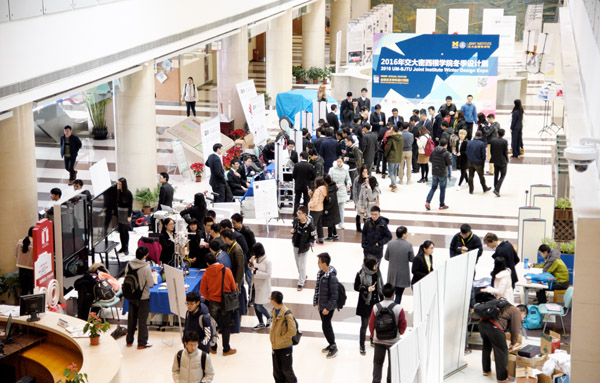 2016 JI Winter Design Expo
2016 JI Winter Design Expo
Innovative Freshman Projects Show Smart Living at Finger Tips
Freshman projects focus on tackling practical problems encountered in daily life with innovative smart solutions, such as automatic Greek yogurt machine, auto-heating insoles, a gadget allowing you to play games while running on the treadmill, etc.
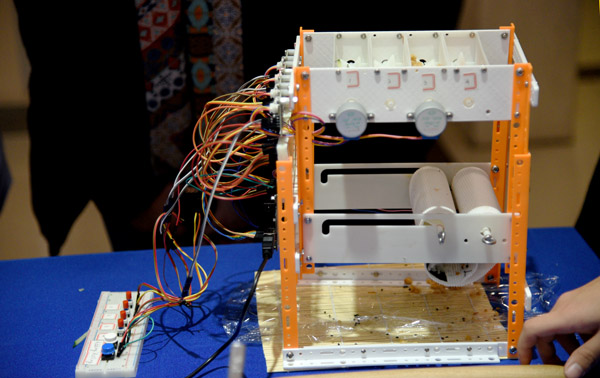 Domestic sushi-making machine
Domestic sushi-making machine
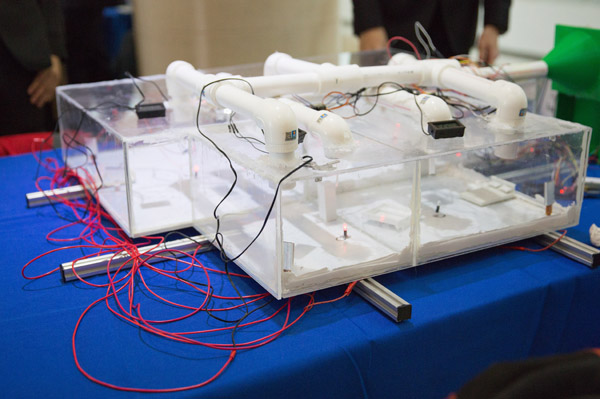 Smart central air-conditioning system
Smart central air-conditioning system
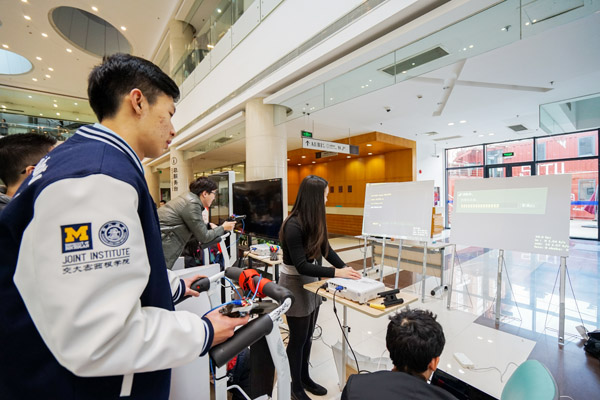 “Crazy Runner” allows game playing while running on the treadmill
“Crazy Runner” allows game playing while running on the treadmill
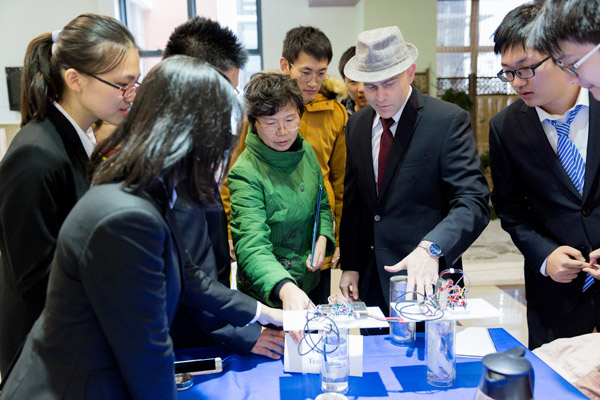 Ideal-temperature water bottle
Ideal-temperature water bottle
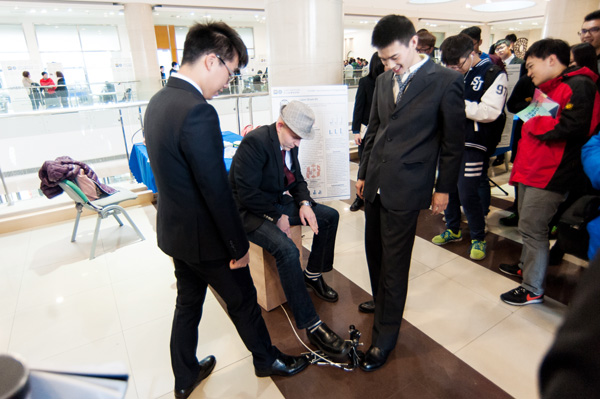 Cajon drum kit
Cajon drum kit
The “Cajon drum kit” provides a space and cost solution for drum enthusiasts. The project team made a 50-cm-high wood box that contains a snare, two bongos and a base drum. The player sits on the box and kicks the connected pedal to play the drums. The set costs 300 RMB and is easy to play and learn.
Regardless of speed, every car passing over a speed bump is subjected to vibrations which will damage the vehicle structure and cause driving discomfort. The “Smart bump” team combines electronic and mechanical means to detect the speed of an approaching vehicle and give appropriate feedback to adjust the speed bump in order to minimize unnecessary damage and discomfort.
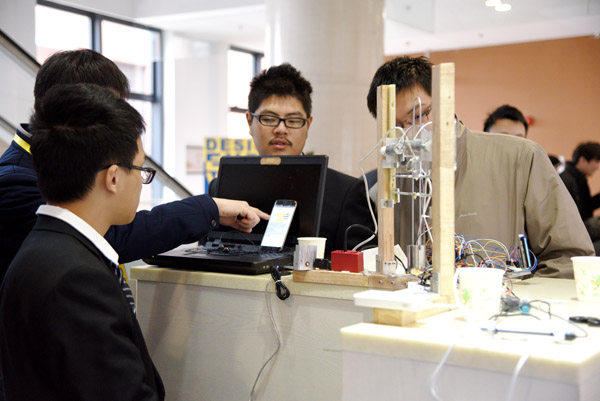 Bad oil detection system
Bad oil detection system
Food safety has been a common “pain” for Chinese consumers. In order for people to stop worrying about the health hazards of cooking oil, the “Bad oil detection system” team designed a system to measure viscosity, color and conductivity to judge an oil’s quality. Blue tooth technology is used to connect the system with mobile phones so that consumers can test food oil in various settings such as restaurants or food stalls.
Global Corporate Collaboration is the New Mode of JI Design Expo
As in the past, increasingly more capstone projects focus on providing innovative solutions for practical problems encountered by multinational companies. Among the 19 capstone design projects, 17 were sponsored by leading international companies, including General Electric, Siemens, Intel, Huawei Technologies, United Automotive Electronic Systems. These projects closely related to daily living were derived from the key R & D projects of those industrial giants.
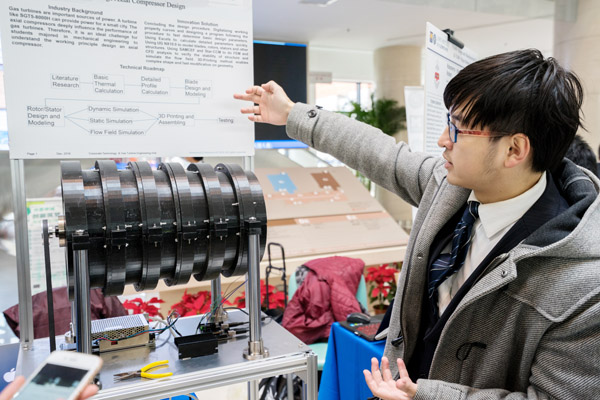 Fast multi-stage compressor design
Fast multi-stage compressor design
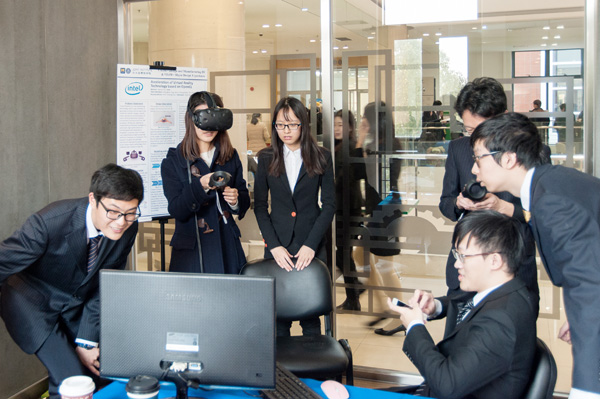 Acceleration of virtual reality technology based on OpenCL
Acceleration of virtual reality technology based on OpenCL
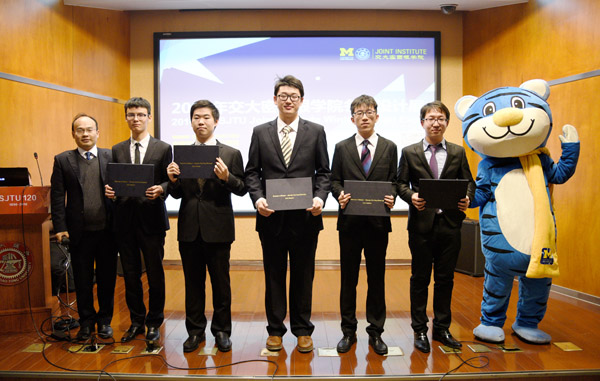 Machine learning: Think and speak” team won the silver award
Machine learning: Think and speak” team won the silver award
As the custodian of machinery and equipment, a wide range of sensors lay the foundation of modern industry. A large-scale industrial equipment is typically mounted with hundreds of thousands of sensors with different functions. How to efficiently collect sensor readings and thus infer the condition of the equipment has been a major problem of a smart factory. The “Machine learning: think and speak” team, sponsored by Siemens, turned the problem over to computers, where each sensor is connected to the network. The sensor readings are uploaded to the central server in real time and recorded in a high-performance database. The technician can remotely connect to the central server through a hand-held device with voice output and speech recognition capability, thus the working status of the current machine can be monitored and the workload of the technicians is greatly reduced.
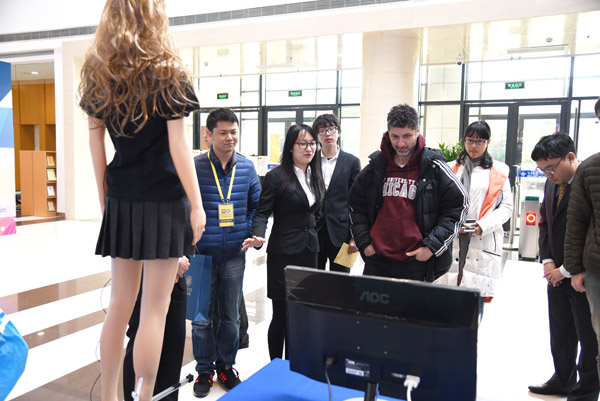 Robot for Huawei autonomous car simulation test
Robot for Huawei autonomous car simulation test
In recent years, unmanned vehicles have become a hot topic and have been undergoing rapid development. However, the safety has been one of the biggest concerns. How to ensure the safety of unmanned vehicles before they are on the real road is an urgent problem to be solved. To this end, the team of “Robot for Huawei autonomous car simulation test” produced an enclosed simulation system with a moving platform to test how it reacts to robot pedestrians and other cars. The mobile platform is a 4-wheeled chassis made of aluminum alloy under the remote control of basic movements, steering, robot state feedback, emergency braking and other functions. The chassis can be fitted with either a human model or a 1: 1 Smart Fortwo vehicle model and still simulates the situation reasonably well at higher loads.
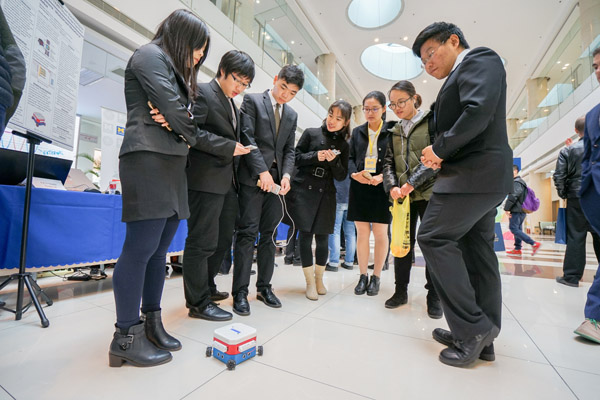 Roboterra: Modularized Educational Robot
Roboterra: Modularized Educational Robot
With the continuous development of information technology, science and technology are gradually applied to the field of education. Modularized educational robot combines learning and entertainment to help students learn a variety of extra-curricular knowledge in their spare time and develop their self-learning ability. The “Modularized Educational Robot” project team, sponsored by the Roboterra Company, has designed a programmable learning robot for students aged between eight and twelve years. Student users need to assemble the entire robot, including mechanical components and electronic components. After the assembling, students need to program the robot with the codes provided for completion. The educational program gives students advanced exposure to mechanical and computer knowledge. For entertainment, the robot can be manipulated to play a maze game which targets this age group. Through the game, students can improve logical reasoning and spatial capabilities.
 Project advisers giving reviews
Project advisers giving reviews
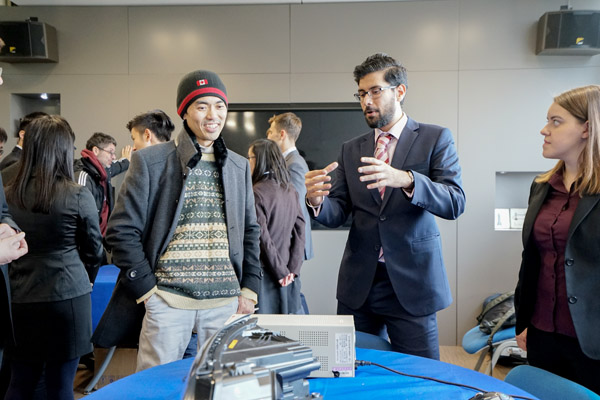 “Global Interdisciplinary Design Project” team presentation
“Global Interdisciplinary Design Project” team presentation
In addition, the “Global Multidisciplinary Design Project” team which consists of undergraduate students from both JI (nine) and UM School of Engineering (six), made their Design Expo debut, sponsored by the General Motors Corporation. The project aims to foster students’ teamwork and practical skills in a cross-cultural, interdisciplinary and industrial context, helping engineering students gain experience and develop the competencies required for qualified engineers. Team members completed the GM-sponsored project in both Shanghai and Ann Arbor through cooperation on location and remotely.
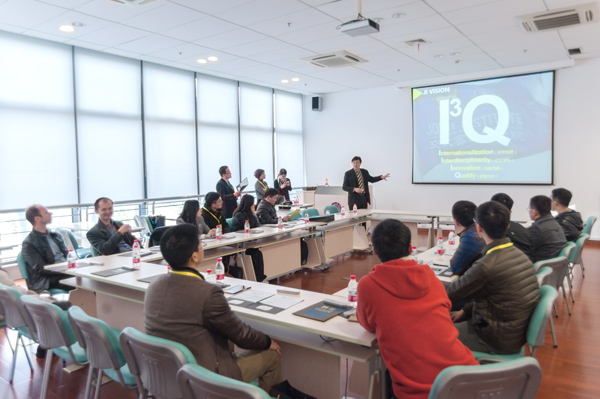
Since the inception of corporate-sponsored projects at JI in 2010, more and more multinational companies have been wooing the talented JI students to work on their market-oriented projects. This Design Expo attracted representatives from 15 companies such as Huawei, Siemens, General Motors, Bosch to visit. In meeting with JI faculty and administration, they expressed strong interests to continue collaboration with JI in the areas of capstone design, research cooperation, employment and internships, scholarships and career development guidance. In recent years, the proportion of corporate-sponsored capstone design projects has been shooting up. The win-win collaboration achieves synergies by the industrial giants tapping into JI’s rich resources of excellent students and top-caliber faculty.
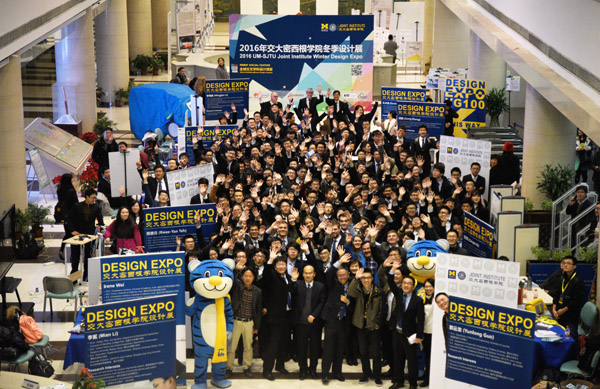 Faculty, staff, and students at 2016 Winter Design Expo
Faculty, staff, and students at 2016 Winter Design Expo
2016 JI Winter Design Expo Award List
Vg100: Introduction to Engineering
Best Innovation Award: Smart bump
Best Technology Award: Bad oil detection system
Best Exhibit Award: Auto-heating insoles
VE/VM450 Capstone Design Projects
Gold Award:
Roboterra: Modularized Educational Robot
Silver Award:
Most Popular Award:
Fast multi-stage compressor design
 2016 JI Winter Design Expo
2016 JI Winter Design Expo Domestic sushi-making machine
Domestic sushi-making machine Smart central air-conditioning system
Smart central air-conditioning system “Crazy Runner” allows game playing while running on the treadmill
“Crazy Runner” allows game playing while running on the treadmill Ideal-temperature water bottle
Ideal-temperature water bottle Cajon drum kit
Cajon drum kit Bad oil detection system
Bad oil detection system Fast multi-stage compressor design
Fast multi-stage compressor design Acceleration of virtual reality technology based on OpenCL
Acceleration of virtual reality technology based on OpenCL Machine learning: Think and speak” team won the silver award
Machine learning: Think and speak” team won the silver award Robot for Huawei autonomous car simulation test
Robot for Huawei autonomous car simulation test Roboterra: Modularized Educational Robot
Roboterra: Modularized Educational Robot Project advisers giving reviews
Project advisers giving reviews “Global Interdisciplinary Design Project” team presentation
“Global Interdisciplinary Design Project” team presentation
 Faculty, staff, and students at 2016 Winter Design Expo
Faculty, staff, and students at 2016 Winter Design Expo




